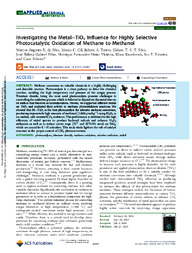Investigating the Metal?TiO2 Influence for Highly Selective Photocatalytic Oxidation of Methane to Methanol.
Investigating the Metal?TiO2 Influence for Highly Selective Photocatalytic Oxidation of Methane to Methanol.
Author(s): SILVA, M. A. R. da; GIL, J. C.; TORRES, J. A.; SILVA, G. T. S. T.; GABRIEL FILHO, J. B.; VICTÓRIA, H. F. V.; KRAMBROCK, K.; TEIXEIRA, I. F.; RIBEIRO C.
Summary: ABSTRACT: Methane conversion to valuable chemicals is a highly challenging and desirable reaction. Photocatalysis is a clean pathway to drive this chemical reaction, avoiding the high temperature and pressure of the syngas process. Titanium dioxide, being the most used photocatalyst, presents challenges in controlling the oxidation process, which is believed to depend on the metal sites on its surface that function as heterojunctions. Herein, we supported different metals on TiO2 and evaluated their activity in methane photooxidation reactions. We showed that Ni?TiO2 is the best photocatalyst for selective methane conversion, producing impressively high amounts of methanol (1.600 ?mol·g?1 ) using H2O2 as an oxidant, with minimal CO2 evolution. This performance is attributed to the high efficiency of nickel species to produce hydroxyl radicals and enhance H2O2 utilization as well as to induce carrier traps (Ti3+ and SETOVs sites) on TiO2, which are crucial for C?H activation. This study sheds light on the role of catalyst structure in the proper control of CH4 photoconversion.
Publication year: 2024
Types of publication: Journal article
Unit: Embrapa Instrumentation
Keywords: Methane oxidation, Selective oxidation
Observation
Some of Embrapa's publications are published as ePub files. To read them, use or download one of the following free software options to your computer or mobile device. Android: Google Play Books; IOS: iBooks; Windows and Linux: Calibre.
Access other publications
Access the Agricultural Research Database (BDPA) to consult Embrapa's full library collection and records.
Visit Embrapa Bookstore to purchase books and other publications sold by Embrapa.

